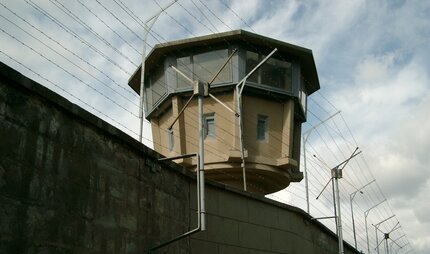
Marienfelde Refugee Center Museum
Berlin between East and West
It was the first point of arrival for refugees from the GDR. For you, it is a place of remembrance – the Marienfelde transit camp.
A story of escape and suppression - today the Erinnerungsstätte Notaufnahmelager Marienfelde is a museum and memorial. It tells the story of millions of East Germans who make their way to the Federal Republic in the West. Marienfelde is the first station in The Golden West for many refugees at the time. On historic ground, the museum displays more than 900 documents and original artefacts. Learn about adventurous escape attempts and what moved these people to flee.
The "gateway to freedom": a story of flight
At the end of the 1940s, more and more East Germans are already arriving in West Berlin. With little living space, migration after the war soon becomes a problem. Finally, in 1953 an emergency reception centre is established at Marienfelde. The building almost fills up within the first year. After the fall of the Wall, German citizens from the former Soviet Union arrive here, in the same way refugees from the Middle East and Africa have since 2010. At the same time, the Notaufnahmelager Marienfelde memorial is resurrected to remember escapees from the GDR.
The permanent exhibition, located in this historic building, displays escape plans and routes many took to start anew in West Germany. You begin inside the simple administration building you'll see objects left behind by refugees, such as a radio from the 1960s. Refugees' cases illustrate how little people can take with them on their departure. Newspaper reports and photo archives recall the tension and turmoil of these years. Get an impression of what it means to leave everything behind through photos, audio and video witness reports. You'll also get to know returnees and their reasons for coming back to East Germany. You will then enter a fully reconstructed refugee home. The austere interior vividly shows the spaces that refugees at that time have available to them.
Erinnerungsstätte Notaufnahmelager Marienfelde presents
- Regular special exhibitions.
- Escape stories: witnesses tell of their experiences on video.
- Photographs from more than 40 years at the refugee centre.
- Reconstructed refugee housing from the 1950s.
- Stories about people who moved from the West to the East.
More stations in the history of the GDR: Bernauer Straße border and the Tränenpalast
It's a dramatic picture: in 1961, the Berlin Wall is constructed. At Bernauer Straße, a young East German soldier drops his rifle and flees to the West. This famous image towers as a large mural at the corner of Bernauer Straße/Brunnenstraße today. An original watchtower and wall fragments recall the time of the Cold War. Video and audio stations support your tour with contemporary witness interviews and in-depth information. On the west side of Bernauer Straße, a museum houses numerous exhibits including original equipment used by the border troops of the GDR. The tragic history of the former border crossing at Friedrichstraße train station is retained in the name Tränenpalast (Palace of tears). Since 2011, it has housed the permanent exhibition "Everyday Life During the Division of Germany". In an area of 550m², you discover reports by contemporary Germans about their experiences. Reconstructed clearance cabins create an authentic feel at the former border as you wait to enter or exit.
Tips for your visit to Marienfelde
The S-Bahn line S2 takes you directly to Marienfelde station. From there, the M77 takes you directly to the memorial. There is also a large Park&Ride at the museum. Alternatively, it takes about eight minutes to walk from the station. The exhibition is free for all visitors. Public guided tours take place every Sunday at 15:00. Private tours can also be booked.
Opening hours
Tuesday to Friday 9 a.m. to 5 p.m.
Saturday and Sunday 11.30 am - 5 pm



